Training Future Primary School Teachers in the Context of Developing Constructive Skills in Younger Pupils
Training Future Primary School Teachers in the Context of Developing Constructive Skills in Younger Pupils
Author(s): Olesia Makoviichuk, Alona Shulha, Olha Shestobuz, Iryna Pits, Inna Prokop, Hanna ByharSubject(s): School education, Educational Psychology
Published by: Editura Lumen, Asociatia Lumen
Keywords: creative development of pupils; educational and methodical complex; handicrafts training and its practical aspects; stages of training; innovative methods;
Summary/Abstract: Constructive skills help younger pupils to perceive and evaluate the harmony in life, nature, art, understand and create beauty in the surrounding reality and be creative. Therefore, it is crucial to train primary school teachers to develop constructive skills in younger pupils to reinforce their creative development. The paper aims to theoretically justify and experimentally verify the content, forms and methods of effective training of future primary school teachers for developing constructive skills in younger pupils. The students were divided into two groups, namely control group (CG –132 respondents) and experimental group (EG – 137 respondents). It presents the author’s educational and methodical complex, which reveals the content of such training and the use of effective forms for organizing the educational process in higher education institutions. It analyzes the levels of readiness of future teachers to develop constructive skills in younger pupils based on questionnaires, interviews, expert assessment, self-assessment, grading of teachers’ personal and professionally essential qualities, tests, observations and methods for assessing creative thinking and motivation towards learning in younger pupils. The results obtained from the formative stage of the pedagogical experiment in the experimental group (EG) show that a mean value of a low level of future primary school teachers’ readiness to develop constructive skills in younger pupils has decreased by 30.6%; a mean value of a sufficient level has increased by 14.9%; a mean value of a high level has decreased by 15.6%. At the same time, the corresponding values in the control group (CG) have not changed significantly. The results of the experimental work prove the expediency of introducing the author’s model in the training of future primary school teachers.
Journal: Revista Românească pentru Educaţie Multidimensională
- Issue Year: XII/2020
- Issue No: 1 Sup1
- Page Range: 232-250
- Page Count: 18
- Language: English

